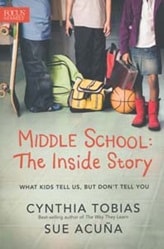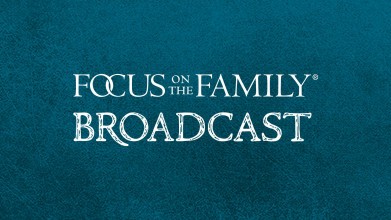
Improve Yourself, Improve Your Relationships
Drs. Les and Leslie Parrott explain how you can improve your marriage by becoming emotionally healthy, and examine three key aspects of good emotional health.
Home » Episodes » Focus on the Family Broadcast » Navigating the Middle School Years
Sue Acuna: So all these changes are happening and they’re very introspective. They just think about what’s going on. They study themselves in the mirror, which is why you can’t get into the bathroom. So that whole self-centeredness, what appears to be, “I’m the most important person in my world,” is actually, “I’m not aware there’s anybody else because I’m so busy trying to figure out who I am and who I’m becoming.”
John Fuller: That’s Sue Acuna, describing an important transition for your child into the middle school years. And today on Focus on the Family we’ll learn more about the unique challenges these kids and us, as parents, will experience during this important stage of development. Your host is Focus president and author, Jim Daly. And I’m John Fuller.
Jim Daly: I remember going through this phase with the boys, and it was so much fun watching them grow up and seeing how their minds work as they begin to make their own decisions. But to be honest, there was some stress as well as Trent and (laughs) Troy were, um, testing mom and dad’s limits, and, um, you know, trying to establish boundaries during that time. That’s common behavior for these children ages 10 to 14 as they develop self-awareness and the awareness of other people, and how all of that reflects on their own identity.
Uh, there’s a lot going on physically, emotionally, and socially during the middle school or junior high years. So, we’ve invited a pair of experts to help us better understand how these kids think and feel, and why they behave the way they do. (laughs)
John: Yeah. We recorded a conversation with Sue Acuna, who we heard from a moment ago, and Cynthia Tobias about this. Um, Sue is a junior high teacher with more than 20 years of experience in education. And Cynthia is a well-known author, speaker, and educator who founded Applied Learning Styles. And together, uh, these two women have written a book called Middle School: The Inside Story: What Kids Tell Us But Don’t Tell You. You’ll get details about this book and find out more about our guests when you stop by focusonthefamily.com/broadcast.
And now, Jim, here’s how you began the recorded conversation with Cynthia Tobias and Sue Acuna on today’s Focus on the Family.
Jim: In your book, Middle School: The Inside Story, you said this right on page five, and I’m telling you, guys, um, everybody, if you have kids or you have grandkids in this spot you need to get this book because it- it’s illuminating. Page five, right there, you said, “These are critical years. Teens who don’t have good relationships with their parents during middle school are going to have a very tough time in high school.”
Cynthia Tobias: That’s right.
Jim: That’s what grips me because I see, perhaps, some of that behavior that is nonsensical, that you’re talking about, Sue, that you see every day in your classroom, and you begin to panic. And the pillow talk between Mom and Dad begins to be-
Cynthia: (laughs)
Jim: … “Are we gonna make it? What kind of kid will this be in high school? I mean, I’m worried.” What are those keys things we need to be understanding about where these, um, middle schoolers are emotionally?
Cynthia: It- it sounds silly and probably too obvious, but you really can’t afford to take it too personally. I mean, this is what middle schoolers do for the most part. It’s-
Jim: You just crushed moms though.
Cynthia: (laughs) I know.
(laughs)
Well, it’s a very normal part of development. And, um, the three things that we say in the book that middle schoolers want more than anything else is to be listened to, to be understood, and to be taken seriously.
Jim: How does a parent begin to make that repositioning after elementary school, which is packing their lunch, telling them what to do, when to get up, when to wash their face, when to brush their teeth, all the chore lists that they’ve got? I mean, that’s been the middle school and preschool years. Now, all of a sudden, you want us to talk to them like an adult almost.
Cynthia: Right. So you’ve got a good illustration of- of becoming less of a manager and more of a consultant.
Sue: We had a consultant a few years ago come to our school and he gave us advice on what could make us a better school. But he didn’t hang around to make sure we did it.
Jim: (laughs)
Sue: And I thought, “Wow, that’s what parents of middle schoolers need to do. They need to give advice and they need to step back and let the middle schooler either follow that advice and be successful or not follow that advice and learn the consequences.
Jim: Now we often talk on this show about that hovering parent. It- it could be both of them. Um, that adds complexity to this because it’s a hard thing to detach because you don’t think they’re mature enough. You just talked about the insaneness of middle school years, and how ridiculous, you know, some of their emotions can be. So as a parent, you’re sitting there thinking, “I’ve gotta stay close.” And you’re saying be the consultant and kinda back up. That doesn’t come naturally.
Cynthia: Well, it’s like relaxing your grip on the steering wheel but not taking your hands off the wheel.
Jim: Hmm.
Cynthia: They- they still need you. They’ll always need you, but how they need you changes through those developing ages. So you can’t afford to hang on so tightly. But you can’t afford to let go either.
Sue: And like you said, Jim, sometimes parents panic and they think, “I need to exert more control. I need to have more limits and more boundaries,” which, of course, creates a child who chafes against that, who wants to rebel against that.
Jim: Well, talk to me about that for a minute because it’s natural. Let’s say your- your middle schooler is not getting the grades that he or she is capable of getting and you begin to apply more pressure. Now I think some of that probably is reasonable. But there can be a point where it- now you’re taking the responsibility off of their back and you’re wearing it as the parent. How do you know when you’ve gone too far?
Sue: I watch for signs with the child. When I have kids who are cheating. Cheating, to me, is not often a sign of a bad character, it’s a sign of a child who’s under so much pressure that she’ll do anything to keep up the grades.
Jim: Hmm.
Sue: And I think-
Cynthia: Pressure from the parent.
Jim: Yeah.
Sue: Well, and from themselves.
Cynthia: Mostly a lot does.
Sue: But I think if you involve the child, a lot of times parents just make decisions. “Okay, you’re getting a low grade. This is what’s going to change.” Much better to sit down and say, “You’re getting a low grade. How do you think we need to change this? What do we need to do differently? What- what changes do you want to make?”
Cynthia: And remember, they’re still wet cement and there aren’t permanent grades. The permanent grades don’t count ’til 9th grade. That doesn’t mean that you let them get by with whatever. But that means that you’ve got a couple three golden opportunity years where you actually have grace.
In other words, you can start experimenting with what- what works and what doesn’t work. Because you still have a safety net. Until 9th grade, you’ve got a safety net. So you can sit and you can talk to them, and say, “You’re having difficulty getting your homework in or remembering what you did. What do you think it would take? What would you like to try as a system to see if it works?” And then that way if it doesn’t work and you fail, we’ll try something else. But the failure’s not permanent.
Jim: Uh, that was the next place I wanted to go, Cynthia, was the fears that students have in the middle school years. And, Sue, again, you’re teaching, you’re seeing them all the time. What does it look like and what do parents not know that they’re telling you? Like you’ve said in your book, Middle School: The Inside Story: What Kids Tell Us But Don’t Tell You. This is a perfect spot. What are their real fears that they’re not gonna share typically with mom and dad?
Sue: You know, we live in a time when we actually have intruder drills at school.
Jim: Mm-hmm.
Sue: And you’d think that kids would be worried about school shootings, but to them, that’s kind of remote, it’s kind of happening in- in other places. They’re much more worried about looking stupid, feeling rejected. I think most of us can remember the pain of going into the lunchroom when your friend is absent from school, and wondering, “Who can I sit by? Where am I going to sit? If I sit with these people am I going to be rejected? Am I going to say something about a television show that I like and have everybody laugh and say, ‘Wow, I can’t believe you still like that’?” That pain is very real, and it’s something they face every day.
Jim: Yeah.
Cynthia: That’s the number one fear bar none. And to all the kids that we talk to, um, we, you know, at first, they would tell us all the typical things they expected us to ask. And they would say, you know, fear of losing a parent and fear of, you know, somebody shooting at the school. And then when we said, “Okay, but, like, if- if- really, honestly, what is your number one fear if- if you really get down to it?” And everybody said looking stupid.
Jim: Mm-hmm.
Cynthia: You know, having something go wrong and having people think you’re stupid. And I remember that in- in junior high. In fact, if- if you wanna refresh that for you and you wanna tell your kids about your school experience, they don’t wanna hear a lot of stories. Just pull out your 7th-grade picture.
Jim: (laughs)
Cynthia: (laughs)
Jim: Yeah, right.
Cynthia: (laughs) A picture’s worth a thousand words. And say, “I remember how I felt, and I remember how I was so self-conscious.” And that’s one of their biggest fears.
Jim: Yeah.
Sue: You know, Jim, this is a daily thing. It starts when they get up in the morning and decide what to wear to school. And if they have a school uniform, which a lot of middle schoolers do, then it’s, what kind of lunch box do they have? What kind of backpack do they have? What does their hair look like? Because all it takes is for someone to say, “(laughs) Nice backpack” and their whole day is ruined. What is it? What’s wrong with it?
Jim: (laughs) Yeah.
Sue: How many other people don’t like it? And now we want them to take an Algebra test.
Jim: Well, and you’re- you’re saying something that is so prevalent in the middle school years, and that is, uh, kinda the kids that are in the in-crowd really are ruthless with the kids that are seen as the outside crowd. And that can be built around capability, like the- the sports kids, the kids that are the jocks or what have you. Uh, they can come together and they make fun of the non-athletic people. Uh, you have, you know, whatever, the good-looking class that looks down on the not-so-good-looking class. It just adds incredible pressure to all the insecurities you already have.
Let’s go back to your three concepts or your three things that the, um, junior high, middle schooler really wants. You said to be understood. Talk about what it means and what you mean by, um, helping your middle schooler feel that they are understood. What does that conversation look like?
Cynthia: One big word, right, Sue?
Sue: Yeah. Empathy.
Cynthia: Yeah.
Jim: Empathy.
Cynthia: Empathy. What do you-
Jim: So play that out. What does that look like?
Sue: Well, when my son was in high school or in 9th grade, so he was fairly young. He came home from school one day and flung his backpack in the hallway and said, “School sucks, and I hate my teacher and I’m never going back.”
Jim: (laughs)
Sue: Well, what’s a parent’s first reaction? “Don’t say ‘sucks’.”
Jim: Right.
Sue: “And you’re not okay to hate your teacher. And you have to go back to school. And you should be thankful for the opportunity.” What have you just communicated to your child? “Your feelings don’t matter. What matters to me is that you do what I tell you.”
Jim: How should they handle that?
Sue: “Aw. Looks like you had a bad day. You seem upset. Something bad happen today?” It’s what I want my spouse to say when I come home and say, “Oh. I had a terrible day at work.” I don’t want him to tell me how I should feel. I want him to say, “Wow. You had a bad day. Tell me about it.”
Jim: Huh.
Cynthia: Remember, this is a golden time too for them. They’re figuring out, from you, how do adults interact? How do they talk to each other? ‘Cause you’re the one I’m gonna look for. How does an adult function in the world? And so, if you’re talking to them still like they’re a child, they’re not getting any respect and they’re gonna talk back to you, not with the respect that you want either. So again, you try to use your voice as respectfully, and you demand the respect. And by demand, I don’t mean, “You will respect me.” You just stop talking until they can speak back to you in a respectful voice.
Jim: Uh, Cynthia, you’re the one that wrote the book, The Way They Learn.
Cynthia: Mm-hmm.
Jim: And I, um, you know, that- that is an outstanding book. And there’s so much of that, that plays into this. Temperaments is an easier way for me to say it.
Cynthia: Right.
Jim: Parents have temperaments, middle schoolers have temperaments. And the question is, uh, some people that may have heard what Sue just said and, you know, that way to handle it through empathy, they’ll struggle with that as a parent because, “Doggonit they’re under my roof. You’re not gonna talk like that. You’re gonna respect your teacher. And it’s my rules.” And they feel almost like that’s a biblical approach, uh, because, you know, Proverb says… And fill in the blanks. You’re saying that’s not a very wise approach?
Sue: Because Cynthia always asks that wonderful question, what’s the point?
Jim: (laughs) That’s a-.
Sue: And the point is, (laughs), you want your child to become independent, responsible, kind to others. And how are you going to get them there? Certainly not by pounding on them with your words.
Cynthia: And remember, you’re not saying, “You don’t have to if you don’t want to.” No, of course, I want you to be respectful. I don’t want you to use language like that. I do want you to do your homework. But this is not the time to say it. You wanna get there a different way. You’re still gonna get there. You’re not gonna lower accountability. You’re not gonna compromise on behavior. But if you really want results, then you use the empathetic approach to get there, and you’ll get them.
Jim: Hmm.
Cynthia: If you don’t use the empathetic approach, you’re not gonna get there anyway. So is it worth it?
Jim: You and your book, you have a no-no list. Now, all of us as parents, we’re gonna think, “That’s right. These middle schoolers need a no-no list.” But you’re not talking to the middle schooler. You’re saying this is the parental no-no list.
Sue: Parents are surprised to hear that, yes.
Jim: What does it look like?
Sue: These are things that parents do that keep their kids from communicating. Because one thing I know is kids really want to talk to their parents. Parents are often the reason why they don’t talk to them because they commit some of the things on the no-no list.
Jim: Give me some examples.
Sue: Interrupting.
Jim: (laughs)
Sue: Kids will say, “They think they know the end of my story, and so they’ll interrupt.”
Jim: Ouch.
Sue: (laughs) Yeah.
Jim: (laughs)
Sue: Uh, casting judgment. Saying, “Did you think that was funny? Did you really think that was a good idea?” Instead of saying, “Well, I would’ve laughed too. But, okay, really, we both know, you know, that wasn’t a good thing.” Not paying attention. Kids complain that parents will look at their cellphones while their child is trying to talk to them. And boy, you know, if your teenager does that to you, you’re quick to jump on their case and say, “Stop looking at that thing. Talk to me.”
Cynthia: And one of the big no-nos, of course, is also on that list of three things about being listened to, being understood, and being taken seriously. And so, when the middle school child complains to you and you go, “You know what? That- that is such small ball… Wait ’til you get older. You’ll see.”
Jim: (laughs)
Sue: “When you get a mortgage and a car payment, that’s gonna be nothing.” Well, that- why would I ever wanna tell you anything again then, because if my life is so insignificant compared to yours? So we just- we forget sometimes. We overreact.
Jim: Wow. That’s something very important to highlight because you’re communicating as a parent. “My life and the, uh, adult issues are so far more difficult than what you’re dealing with. Just shake it off. Come on, you’re in middle school.”
Sue: Right.
Jim: “You can manage this. I can manage this.” Well, of course, as a 35-year-old, you can manage middle school far better than you did. But we forget that we went through it, too.
Sue: And their life looks very different. We- we did a- a fun, uh, little anecdote in the book because we were teaching a seminar in Hawaii. Tough duty, I know.
Jim: (laughs) Yeah.
Cynthia: But, great. But so- so one man, who was a- a parent, the first night, then he was also a teacher the next day, and we had talked about this being taken seriously and being listened to and stuff, he said, “I just have to tell you,” he said, “Last night, I made my 10-year-old son his favorite meal. And I wanted to sit down and talk to him. And he said he wouldn’t eat it. He wouldn’t eat it. Nothing I could do would convince him to eat it.”
And he said, “Finally, I was so frustrated with him, I said, ‘Look. I’m trying to listen to you and I’m trying to take you seriously. Don’t you wanna be taken seriously?” And his son said, “No, I wanna be taken to McDonald’s.”
Jim: (laughs)
Cynthia: (laughs) It’s one of those, “Oh, duh.” (laughs)
Jim: Yeah. (laughs) He didn’t want shrimp cocktail.
Cynthia: That’s right.
John: You’re listening to Focus on the Family with Jim Daly. And our guests today are Cynthia Tobias and Sue Acuna. And they’ve written together a fascinating book called Middle School: The Inside Story: What Kids Tell Us But Don’t Tell You. We recommend you get a copy when you call 800, the letter A, and the word FAMILY. 800-232-6459. Or you can stop by focusonthefamily.com/broadcast.
All right. Here’s more of the conversation with Cynthia and Sue on today’s episode of Focus on the Family.
Jim: This is that time. There’s so much change occurring for that 12, 13, 14-year-old. Um, what is the effect of puberty on the mind, the brain chemistry, the emotions? What’s going on here? Because they are moving from being a little boy to being a young man or a little girl to a young lady. Um, how does that impact these kids?
Sue: Wow. Where do you wanna start? (laughs)
Jim: (laughs) Yeah.
Cynthia: (laughs) She’s got a whole classroom full of them.
Jim: Well, you see it every day.
Sue: Right. And- and to begin with. We had a parent who said, “I feel like I’m raising a narcissist.”
Jim: (laughs)
Sue: “Because everything revolves around her.” And, you know, they’re- we can see the physical changes, the growth in height, and the change in body shape. And then mentally, they’re thinking different thoughts. And emotionally, of course, they’re all over the place. Spiritually, they’re starting to ask questions. So all these changes are happening and they’re very introspective. They just think about what’s going on. They study themselves in the mirror, which is why you can’t get into the bathroom. So that whole self-centeredness, what appears to be, “I’m the most important person in my world.” Is actually, “I’m not aware there’s anybody else because I’m so busy trying to figure out who I am and who I’m becoming.”
Jim: When you look at the effect of puberty on a child as well, I mean, now they’re starting to notice each other; boys, girls, et cetera. Um, what does that look like in the classroom, the things they’re not telling us? Uh, your book, you know, uh, what kids tell us but won’t tell you. This area of sexuality, it- it’s blossoming. What are they not telling us as the parents?
Sue: That the most important thing when they walk in the classroom is not, “How will I do on the test today?” But, “How do I look to the other boys in the classroom?”
Cynthia: Yes.
Sue: “How do the girls see me?” Girls come to my classroom, drop their stuff off, and head right to the bathroom-
Jim: (laughs)
Sue: … to experiment with each other’s makeup and- and check out the hair. And the guys go down the hall and they’re all jumping to see if they can touch the ceiling light. And I say, “You know, if you bring that down you’re gonna deal with the principal.” But that’s- they’re constantly measuring themselves and- and comparing themselves to each other, and very, very much aware that the other sex is watching them in the classroom.
Jim: What’s a healthy way for us as parents to channel that energy?
Sue: The best thing to do is always to hit them head-on and talk about what’s happening, you know. “What have you noticed about the guys in your class?” And- and most of the time the kids will be squeamish. One thing that we found talking to parents is, listen to how the kids are talking to each other. If they’re sitting behind you in the backseat with a buddy, listen carefully but don’t make any comments.
Jim: What does that sound like?
Cynthia: Because the good thing is- well, the good thing is you- they don’t recognize you’re in the room because they’re in a bubble and it’s all about them anyway. So if you just clam up, you’re driving the car and the kids are in the back. Just don’t say anything and they will truly forget you’re there.
Jim: (laughs)
Cynthia: And they will start talking and you will (laughs) understand better what they’re talking about to their friends. It’s the weirdest thing, but it actually works that way a lot of the times.
Jim: Now, this is the- perhaps the, uh, lighthearted side of it. The normal, uh, development of it. Checking your makeup and touching the lights or the ceiling. But this is also the point where that middle school girl or boy, they don’t feel like they’re fitting in. Those children that aren’t developing at the same pace, they’re probably very vulnerable to social pressure. And what does that look like?
Sue: Well, and it’s tough because at this age they don’t have a lot of filters. And so, it’s not unusual for them to say something like, “Oh, look at Jim. He’s still so short. Look at him next to Trevor. He looks like a child next to Trevor, who looks like a man.” And- and I’m always reminding them, you know, what was okay when you were okay in third or fourth grade isn’t okay anymore because everybody is self-conscious.
Jim: Is that a good thing for a parent to help that child develop a bit more of a filter? (laughs)
Sue: (laughs) To help the short child develop more of a filter or just to help all children?
Jim: Well, just for your children to be mindful of what words do to each other. And that’s something Jean and I will work on. Make sure you know you- what you’re saying.
Sue: Yes.
Jim: And they- you’re right. They don’t always understand the impact of their words.
Sue: And what that means to a young man who’s not as tall as all the others, who is not taken as seriously. There are studies that show, you know, even in the adult world, taller men tend to have more respect. And so, when you’re in seventh grade and you look around, and everybody else has hit their growth spurt, or at least you think everybody else has hit their-
Jim: Right.
Sue: … (laughs) growth spurt. That other guy who’s your height, he doesn’t matter. You start to feel like you don’t measure up.
Cynthia: And remember, on top of all this, you as a parent, you wanna try to do what you can to at least covertly protect their dignity it- to the best of your ability, you know, because they’re- they’re gangly, they’re awkward, they’re running into things, they’re spilling things off the table. So that only adds to their humiliation. It adds to their self-consciousness. And so, you wanna be sure that, for instance, if- if you notice that your son doesn’t smell very good.
Jim: (laughs)
Cynthia: You- you definitely got body odor, right?
Jim: This is a book for reality, isn’t that?
Cynthia: (laughs) Yeah.
Sue: Oh, yeah.
Cynthia: And- and you’re thinking, well, other kids will notice it too, and they- they can make fun of him. But how do you- how do you tell your kid he stinks, right? And so, it’s just- it’s the practical things. For example-
Jim: (laughs) Well, tell us, how do we do that?
Cynthia: Yeah. Go ahead, S- Sue. You- she’s got a great example of this. First of all, kids didn’t know. In Sue’s class, this blew my mind. They didn’t know what body odor smelled like.
Jim: (laughs)
John: They- they asked, “What does BO smell like?” And I said it’s that onion-y, musky smell. “Oh, is that what that is?”
Jim: (laughs)
Sue: (laughs) “I didn’t even know.”
Cynthia: “Oh, I smell that a lot.
Jim: (laughs) “I smell that all the time.” (laughs)
Sue: But I- I had a student a few years ago, and he was being raised by his grandma and his mom passed away when he was like 9 or 10. He liked to wear the nylon jersey shirts. And those hold the smell in. And so, I pulled him aside. We had a really good relationship. And I said, “You know, Tony, sometimes your shirt doesn’t smell very good.” And he said, “Oh, I- I always forget deodorant.” So I said, “Let’s come up with a code word.” I said, “There’s a woman’s deodorant named Secret. So I tell you what. You keep deodorant in your gym bag and I’ll keep it in my closet. And if I come to you and say, ‘You know, Tony, I’ve got a secret.’”
Jim: (laughs)
Sue: “That’s your clue that you need to go clean up and reapply deodorant. And if you come to me and say, ‘Mrs. Acuna, I’ve got a secret.’ I know you’re really asking for permission to go and take care of things.”
Jim: (laughs)
Sue: It was a great system.
Jim: But that’s a- that’s a great teaching point, and coming from a teacher. Uh, you know, teachers hold a very special place in all students’ hearts. I do believe that. And when you have that good relationship that’s great. Parents can struggle with that. I think, you know, for us, we’re the more direct route, Cynthia, where we said, “Man, come on, you guys. You gotta smell better than that.”
Cynthia: (laughs)
Jim: “Get out there and take a shower.”
Cynthia: And it sometimes works that way.
Jim: Yeah. I mean, it did.
Cynthia: It- it does. But a lot of times, you might wanna take, again, the empathy approach or the sideways approach that says, “Boy, when I was in junior high. I remember there was this one girl and she always smelled so bad that everybody made fun of her. I always thought to myself, ‘Oh, I would hate to be that girl.’” So that’s just kinda the little hint, right?
Jim: Right.
Cynthia: Saying, “Boy, I wouldn’t wanna be that girl, either.” I mean, you can go in sideways if you need to.
Jim: Uh, you- you know, we’ve talked about the physical changes and the emotional changes and, you know, (laughs) some of the humor in all of that at this age. But, uh, spiritually, how do we help them understand the world they’re in and the, hopefully, the heartfelt commitment? Not just the lip service commitment that they’ll make to Christ and to a life with him.
Cynthia: This was the part that kinda surprised me a little. I think it doesn’t surprise Sue as much because-
Jim: (laughs)
Cynthia: … kids talk to her about it all the time. And just spending these last two years with middle schoolers. I was- I was a high school teacher, so I was always not as eager to be with middle schoolers.
Jim: Probably a bit tougher, maybe.
Sue: (laughs)
Cynthia: Yeah. And I was- I just fell in love with middle schoolers. Spending all this time. But one of the things about spirituality. When we talk to the kids about spiritual and moral values, they talked more about that than they did a lot of other topics even.
Jim: Interesting.
Cynthia: Because for one thing, they don’t feel like they can talk to their parents about it because they don’t wanna freak their parents out. You know, they’re-
Jim: So they don’t wanna be honest.
Cynthia: Right. Well, they’re thinking, they’re- they don’t even know why. Many of them said, “I’m having doubts about my faith and I don’t really know why.” And- and one thing that Sue will tell them. Tell them what you say when they are worried about telling their parents about their doubts on their faith.
Sue: Well, we tell them that God gave them that brain. He gave them the power of reasoning and He gave them the intellect. And He’s certainly smarter than they are and big enough to handle all of their doubts and questions. So it’s okay to come to God and say, “I don’t get this. Why should I do this? I- I’m angry about this,” because our God is big enough to deal with all of that.
Jim: And it’s a real, honest answer.
Sue: Isn’t that great?
Cynthia: Yeah. And the- and they’re so relieved God doesn’t worry about you simply because you have doubts. And they’re seeking all these ways to kind of personalize their faith. And they ask her these questions, and they even asked us when we were together, “Why is there God? What if there is no God? And why do we go to this church?”
Jim: Hmm.
Cynthia: “And what if I wanna go to a different church?” And if a parent is highly defensive and all worried that, “Oh, no, my child is gonna… What have I done wrong?” Then they’re not gonna talk to you about it.
Jim: Man, this is good.
Cynthia: (laughs)
Jim: Cynthia, I mean, I’m thinking back how often I’ve blown it (laughs) on different things.
Cynthia: (laughs)
Jim: Can you, uh, while your middle schooler is still there, is there a way to make up the ground that we’ve maybe given away as a parent?
Cynthia: Oh, I think so. It’s not easy. Um, I was sitting here, thinking, remembering several years ago. We did a panel with- with different ages of kids including a middle schooler and a high schooler in front of a whole bunch of teachers. And, um, we asked- one of the questions was, “Well, how do we help you be successful and feel good about yourself in school?” And, you know, the kid spoke up and he goes, “Well, if you could just take the time to make me feel unique and special.” And one of the frustrated teachers said, “Look, I got all these students. I don’t have time to make you feel unique and special.” And he- without even hesitating, this kid said, “That’s okay. You don’t have to do it. You asked what it would take.”
Jim: Oh. (laughs)
Cynthia: (laughs) And, you know, as parents, we’re going, “Oh, my goodness. All this is over and I don’t wanna do it. And we- I need to take a shortcut.” Well, okay. You could take the shortcuts. You could take your hands off the wheel. You could just check out.
Jim: Huh.
Cynthia: But what it takes for success, it takes more than that. And it takes some pain, sometimes, and it takes a lot of time. And that- and I’ve personally, and Sue and I both believe, that you really can’t do a really good job of it without supernatural help. Without God. Without Christ at the center of your marriage. Without Christ at the center of your parenting. You know what it takes? That’s what it takes. And it takes a little effort to get there.
Jim: In void of that, maybe that’s the load that we’re all feeling that there’s so much coming at our kids. The culture, social media, sexuality. It seems overwhelming. And, uh, you gotta get in there and fight. You gotta fight for the soul-
Cynthia: Yeah, we do.
Jim: … of your child.
John: You’re listening to Focus on the Family with Jim Daily. And our guests today have been Cynthia Tobias and Sue Acuna. And our discussion featured a fascinating book written by these two women called Middle School: The Inside Story: What Kids Tell Us But Don’t Tell You.
Jim: John, this was a fantastic conversation with Cynthia and Sue, and so practical for parents. And believe me, we know how complicated those middle school years can be. With puberty, and body image, and peer pressure, and so much more.
Jean and I have lived through it with our kids. And the good news is: you and your child will survive. What you need is a great resource, like Cynthia and Sue’s book, which we can send you, uh, when you make a monthly pledge of any amount to Focus on the Family.
We need your ongoing support to help moms and dads improve their parenting skills, build stronger bonds in their family, and teach their children about faith and character issues. Thanks to the generosity of friends like you, more than half a million parents were equipped in these important areas during the past 12 months. Half a million! That is great news. So, a monthly pledge will really help, or a one-time gift as well. Anything you can give to strengthen and support today’s families.
John: Contribute today as you can when you call 800, the letter A, and the word FAMILY. 800-232-6459. Or you can donate and get a copy of the book, Middle School: The Inside Story, at focusonthefamily.com/broadcast.
And thanks for listening to this episode of Focus on the Family. Coming up tomorrow we’ll have a powerful story about one woman’s long, difficult journey to find God’s love.
Preview:
Lynsi Snyder: I also felt just a lot of shame and felt like I was kinda kicked out too, you know?
Jim: Yeah.
Lynsi: Like I can’t. I can’t be a Christian now or I can’t be- I was a Christian, but I can’t be what I’m supposed to be because I’ve already failed, you know?
Jim: Right.
Lynsi: There’s just that defeat, I guess, that was there.
John: On behalf of Jim Daly and the entire team, thanks for listening today to Focus on the Family. I’m John Fuller, inviting you back as we once again help you and your family thrive in Christ.
End of Preview

For more than 30 years, Cynthia Ulrich Tobias has been teaching people of all ages how to discover and use the strengths of their natural learning style to succeed in virtually any situation. She is an author, speaker, and the founder and CEO of AppLe St. (Applied Learning Styles). Cynthia’s latest books include The Way We Work and A Woman of Strength and Purpose, in addition to her classics You Can’t Make Me!, The Way They Learn, Every Child Can Succeed and Bringing Out the Best in Your Child. She has two grown sons. Learn more about Cynthia by visiting her website, www.cynthiatobias.com.

Receive Middle School and an audio download of "Navigating the Middle School Years" for your donation of any amount! Plus, receive member-exclusive benefits when you make a recurring gift today. Your monthly support helps families thrive.

What if you could quickly find relevant insights that grow with your child and have long-lasting influence? Focus on the Family’s weekly age and stage emails have parenting tips tailored to your kid’s age. We cover tantrums to chores, social skills to the big ‘Who am I?’ questions – and so much more!

Visit our online store and purchase a CD of today's program for yourself or to share with a friend.

Give older middle schoolers what they need, not necessarily what they think they want.

What parents can do to pave the way for a strong transition from elementary to middle school.

Jonathan Catherman and his teen sons, Reed and Cole, offer encouragement to parents and kids who are worried about leaving behind the familiarity of elementary school to transition to middle school. Our guests cover topics that include bullies, relationship drama, communication with parents, and much more.

Drs. Les and Leslie Parrott explain how you can improve your marriage by becoming emotionally healthy, and examine three key aspects of good emotional health.

Parenting can be intense, especially raising young children. Moms, especially, have a desperate need for God’s help every single day. Sarah Holmstrom and Stephanie Thurling want to encourage families to make prayer time a regular part of their routine, and they suggest fun games and traditions that can help get your kids more engaged with prayer.

Jean Marie Davis lived a horrific life as a sex trafficking victim for more than 20 years, where she was verbally and sexually abused, tortured, threatened by guns, and forced to live as a prostitute. She finally found freedom when she was invited to a pregnancy resource center (PRC) and introduced to Jesus Christ. Jean discovered her new identity in Christ, found practical help and a new life, and today is the executive director of a PRC in Vermont. (Part 2 of 2)

Larnelle Harris shares stories about how God redeemed the dysfunctional past of his parents, the many African-American teachers who sacrificed their time and energy to give young men like himself a better future, and how his faithfulness to godly principles gave him greater opportunities and career success than anything else.

Amy Carroll shares how her perfectionism led to her being discontent in her marriage for over a decade, how she learned to find value in who Christ is, not in what she does, and practical ways everyone can accept the messiness of marriage and of life.

Jonathan McKee offers parents practical advice and encouragement in a discussion based on his book If I Had a Parenting Do Over: 7 Vital Changes I’d Make.